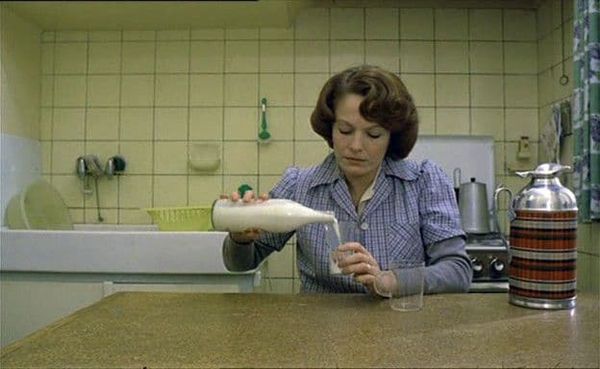 |
| Jeanne Dielman was hailed as the "first masterpiece in the feminine in the history of cinema". |
Her latest film, No Home Movie, had its premiere at the Locarno Film Festival and will screen at the New York Film Festival this week.
Fellow directors expressed their sadness at Akerman's death - read more of those here - including Mark Cousins, filmmaker and critic, who said: "Chantal Akerman has died, but her great films live on."
Jeanne Dielman, 23 Quai Du Commerce, 1080 Bruxelles, her pioneering portrait of a Belgian-widow-cum-prostitute was to change forever the ways in which women were regarded on screen. Hailed as the "first masterpiece in the feminine in the history of cinema" by the French daily Le Monde and rated among the 100 best films of the 20th century by Village Voice, the film came to epitomise an era with its pressing questions about class, social identity, gender and sexuality and became a landmark in feminism and women’s cinema.
Marion Schmid who organised a special focus on her work at the French Film Festival UK in 2012, said: "With more than 40 films to her credit, she spanned a dazzling range of genres from burlesque comedy to experimental documentary, Akerman has confirmed her status as one of cinema’s great innovators, comparable to Godard and Fassbinder in her prolific output and highly personal vision and style."
Akerman entered the film world with Saute Ma Ville (1968), a tragi-comic short about a disturbed teenager memorably played by herself (she stars in several of her films of the 1970s and 80s revealing great dramatic and comic talent). If Godard’s Pierrot le Fou, which she saw aged 15, incited her to make films, it was the American avant-garde movies of Michael Snow and Andy Warhol; the pioneering work of choreographer, dancer and film maker Yvonne Rainer, which she discovered during extended stays in New York that was to have a lasting influence on her film style, especially her preoccupation with cinematic time and perception. Latterly she lived much of the time in New York.
 |
| Je Tu Il Elle, dubbed a ‘cinematic Rosetta Stone of female sexuality’ |
"In the last 30 years, she had ventured into more mainstream territory, taking inspiration in popular genres such as romantic comedy, melodrama and slapstick and experimenting with a more playful, effervescent tone and style. Highlights of this period include Golden Eighties (1986), a sprightly musical in the tradition of great French director Jacques Demy; Histoires d’Amerique (1988), a sensitive docu-fiction on New York’s Jewish diaspora; the poetic love-triangle Nuit Et Jour (1991); her celebrated adaptation of Proust, La Captive (2000); and the burlesque comedy Demain On Déménage (2004) – her commercially most successful film to date.
In the past decade, Akerman had completed a distinguished series of documentaries ‘bordering on fiction’ and carved out a niche as a highly acclaimed video artist exhibiting in museums and art galleries.
After a seven-year break from narrative cinema, she returned to form with La Folie Almayer (2011), adapted from Joseph Conrad’s debut novel, a visually and aurally stunning meditation on colonialism, racism and one man’s obsessive love for his daughter. It was to mark its release that the French Film Festival UK mounted its special focus.
Schmid concluded "Blurring the boundaries between fiction and autobiography, and between cinema and the other arts, Akerman’s oeuvre, like that of the greatly missed Chris Marker, propelled cinema into new, unchartered territory. Rebellious and intuitive, hypnotic and seductive, it continues to exert a fascination that is difficult to resist."






















